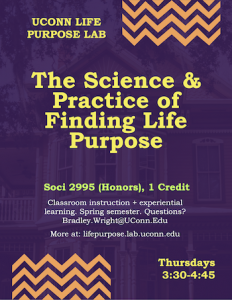[UConn Storrs]
Honors ENGL 1007 recognizes that Honors students are often expected to write more and differently than other UConn students. There are additional opportunities for connection to your own major(s) and greater emphasis on the roles of inquiry and discovery in the humanities. Finally, the Honors sections will culminate with a public celebration of student work.
Two sections of Honors ENGL 1007 will be offered in Fall 2024, each with its own focus:
ENGL 1007-001 (MW 10:10 AM – 12:05 PM)
During this course, we will consider the ways in which people use stories to think through complex moral problems. We will examine a variety of texts (short stories, academic articles, podcasts, videos, songs, etc.) in order to better understand how and why they tell stories about complex moral issues. We will also analyze the ways in which storytelling can shape audiences’ perceptions of moral issues. In particular, your compositions will respond to and shape responses to inquiries such as these:
-
- What is morality? What are moral dilemmas? How are these terms defined by different people and in different contexts?
- How do people use stories to think through complex moral problems? What are the goals of these stories? What are these stories supposed to produce? In other words, what do they do (for individuals, institutions, societies, etc.)?
- How are people defined by stories—the stories they tell, the stories they consume, and the stories that are told about them? What are the real-world effects of this? What is at stake?
- In what ways can your own writing and compositions transform conversations around moral dilemmas and moral issues more broadly? How can diverse kinds of writing and storytelling provide new opportunities for learning and engagement between writer and audience?
While we are working on a common class inquiry, you will develop your own lines of questioning and thought as you investigate moral issues and stories that are important to you. To develop your line of thought, you will look for patterns in your own work and in others’ experiences, follow your own hunches, make your own connections, and define your own terms. This line of thought will develop across many forms, culminating in a presentation in which you put forward your own ideas. Assignments will include, for example: an infographic, discussion board posts, short essays, and a presentation.
ENGL 1007-008 (TTh 3:30 PM – 5:25 PM)
During this course, we will explore a question with no right answer: “What matters in the media we consume?” We’ll consider this inquiry from two angles: what we look for/value in our media, and what ethical responsibility we owe to others. These may seem unrelated, but nothing we do happens in a vacuum. The things we consume and create become one part of how we view the world, in both positive and negative ways. We will consider our context as members of a global society, and how our personal and social values – and biases – intersect with our media consumption.
As we work through individual responses to the class inquiry, our collective goal is not to discover a “correct” answer, but to explore a range of possibilities based on our individual perspectives & interests. To develop your personalized questions, you’ll look for, follow your own hunches, make your own connections, and define your own terms. You’ll explore your questions across many genres and modes, creating projects as individual and unique as each member of our class. In this course we will work on:
-
- Developing personal narratives about your own media engagement and its intersection with our ethical responsibilities as members of a global society
- Curating a media museum that provide context for your personal narrative
- Reframing your narratives and media collections using critical texts from class
- Creating your own questions and postulating your own responses
- Developing unique intellectual projects that matter.
What does media consumption mean?
I’m using “consumption” as a catch-all term for the way we “take in” the work of others: reading, watching, listening, viewing, etc. We’ll define “media” as: anything created for public consumption, whether for the banana entire world or followers on a private account. I encourage you to interpret media broadly, to work through our inquiry by focusing on something you love, be that novels, short stories, plays, music, podcasts, tv shows, movies, video games, paintings or photographs, tiktok, instagram, youtube, tweets, etc.
